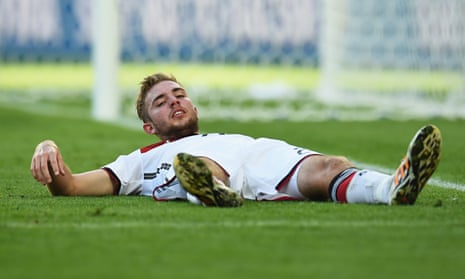Fifa’s medical committee chairman, Michel D’Hooghe, wants to allow referees to stop matches for three minutes to asses head injuries when a concussion is suspected.
Football leaders have been under pressure to protect players better after five concussion cases at the World Cup in Brazil, including several where the player tried to stay on the field. A lawsuit is also being brought in the US, chiding Fifa’s guidelines for players who receive serious head injuries.
D’Hooghe will seek the approval of the Uefa and Fifa executive committees later this month for “strict rules” that go beyond the existing medical guidance.
“The trigger is that nowadays the player has a concussion, the team doctor arrives there and he has to take a decision in 20 seconds – this is materially impossible in some situations,” D’Hooghe said in an interview with Associated Press. “We want to give [the doctor] the chance to do a serious examination.
“We want to give him a new authority because what we have seen at the World Cup, for instance, the moment a team doctor asks for a replacement, suddenly the player jumps up and says, ‘No, no,’ and of course the coach says, ‘Go on.’”
In a high-profile incident in the Premier League last season that inspired the proposed rule the Tottenham goalkeeper Hugo Lloris was allowed to return to the pitch by the coach André Villas-Boas during a match against Everton after appearing to lose consciousness when he was struck on the head by an opponent’s knee.
D’Hooghe said doctors rather than coaches should decide whether the player can remain on the pitch.
“This changes a little bit the function of the team doctor in this specific situation,” D’Hooghe said. “We think that three minutes is a correct time for a good evaluation of head injury concussion to see if a player can continue to play. It’s not always easy. There is no one method in 10 seconds to say if you can go on or not.
“In situations when the player is falling down or is dizzy can he go on or not? What is the risk if he continues because concussions can be really serious medical problems? That is why we said three minutes seems to be reasonable.”
As well as basic questions being put to players, including asking the score, there will be a short neurological examination
“If he stands up and falls down then you know,” D’Hooghe said on the sidelines of the SoccerEx conference in Manchester. “What is his balance if he walks? What is the examination of his eye?”
Regulations for the management of concussion have already been tightened up by the Football Association, with players now forced off the field of play and not allowed to return if there has been a confirmed or suspected period of loss of consciousness.
If the D’Hooghe rules are approved by the Uefa executive committee on 18 September, they can be enforced only in Champions League, Europa League and European Championship matches. If Fifa’s ruling committee approves them the following week, they will apply only in games organised by the world body.
D’Hooghe has found that a concussion case occurs on average once in every 20 games.
“It is not frequent but that does not mean it is not a serious problem,” he said. “For the general world the World Cup was a wake-up call because suddenly we had five concussions direct on television, repeated on television. So everyone thought it must happen very, very frequently.”
The US lawsuit filed by players and their parents does not demand monetary damages but asks governing bodies to alter safety rules including limiting headers for players 17 years old and younger.
D’Hooghe said the new rules were not a response to the legal case.
“The law situation in America concerns young players,” he said. “Also we have done a lot of studies and, if the judge in the court asks for more scientific documentation, he can easily receive it from Fifa.”
